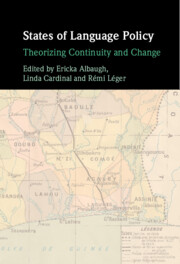Introduction
Published online by Cambridge University Press: 14 November 2024
Information
- Type
- Chapter
- Information
- States of Language PolicyTheorizing Continuity and Change, pp. 1 - 26Publisher: Cambridge University PressPrint publication year: 2024
